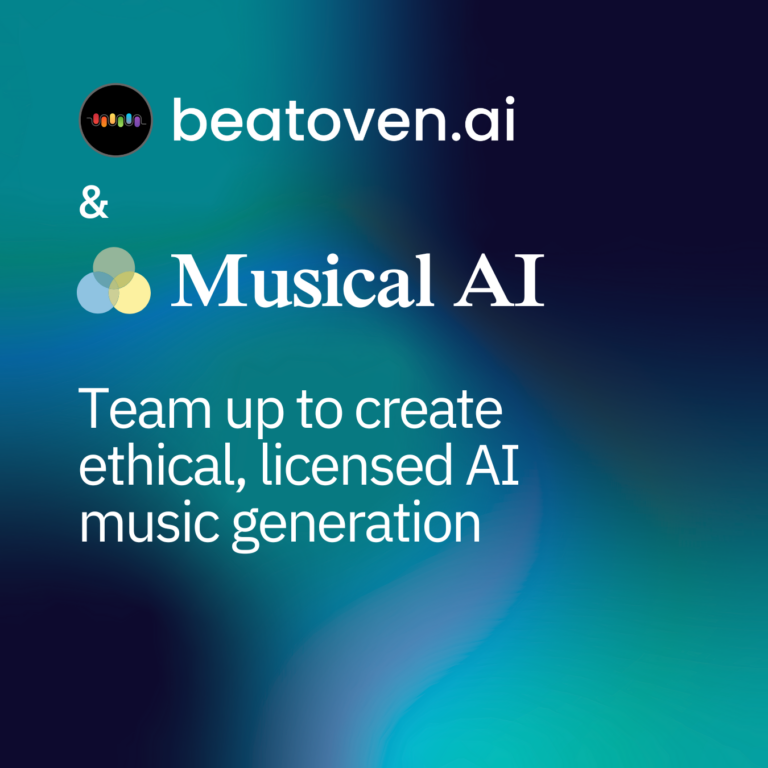Beatoven.ai, certified by Fairly Trained for its ethical AI practices, is partnering with Musical AI to create the first fully licensed AI music generator. The collaboration, announced on December 3, 2024, follows Beatoven.ai’s recognition for using only licensed data in its AI models and maintaining a consent-focused approach to music generation.
The partnership builds on Beatoven.ai’s existing commitment to ethical AI practices. While many AI companies have faced data usage and rights management challenges, Beatoven.ai has built its own music database through direct collaboration with musicians.
This foundation in ethical practices makes their partnership with Musical AI particularly noteworthy. Both companies aim to launch their combined service in late 2025.
What Makes this Collaboration Different?
The new service will train its AI model on a substantial dataset of three million properly licensed songs, loops, samples, and sounds. Musical AI will manage the rights and handle payments to copyright holders, while Beatoven.ai will develop the technical aspects of the music generator.
The revenue-sharing model is designed to work similarly to music streaming services. Copyright holders will receive a portion of the revenue based on how their content contributes to the AI model’s outputs. Initially, the service will be available exclusively to Musical AI’s enterprise clients.
Sean Power, CEO of Musical AI, emphasized their commitment to proper licensing: “There are no more excuses for not doing things right and well. We’re proving this with this first-ever service.”
Why does this Collaboration Matter Now More than Ever?
The announcement comes at a significant time in the AI music landscape. Earlier this year, AI startups Suno and Udio faced legal action from major record labels, including Sony, Universal Music, and Warner Bros. The labels accused these companies of widespread copyright infringement, seeking damages of $150,000 per violated track.
Beatoven.ai’s CEO Mansoor Rahimat Khan, believes their approach could set a new standard for AI business models in creative industries. He highlighted their history of working directly with independent artists and explained how the partnership with Musical AI will help build a sustainable revenue-sharing system using attribution technology.
What does it Mean for the Artists and Content Creators?
This partnership could signal important shifts for music creators and the broader content industry. For musicians and rights holders, it presents a potential model where AI innovation doesn’t come at the expense of their intellectual property. The emphasis on proper licensing and revenue sharing might help bridge the gap between AI developers and content creators.
For the content industry, this could set a precedent beyond just music. As AI-generated content becomes more prevalent across different media types – from visual art to written content – this licensing-first approach might influence how other companies structure their AI services.
The model also addresses a key industry concern: fair compensation in the AI era. Implementing a streaming-service-style payment system suggests that AI companies can build profitable services while respecting and compensating creators. This could be particularly significant for independent artists and smaller content creators who often struggle to protect their rights in the digital space.
However, the real test will come after the launch. The industry will watch to see if this model can deliver technological innovation and fair compensation, potentially creating a blueprint for other AI content generation services.
Looking ahead
The partnership represents a potential shift in how AI companies approach music generation. They’re attempting to create a model that works for technology companies and rights holders by prioritizing proper licensing and fair compensation.
While the service won’t launch until the second half of 2025, it could influence how other AI companies approach similar challenges in creative industries. The success or failure of this initiative might shape future conversations about AI’s role in music creation and copyright management.
For artists and music industry professionals watching these developments, this partnership offers a glimpse of how AI music generation might operate within existing legal and business frameworks rather than trying to work around them.
Whether this approach will become the industry standard remains to be seen, but it marks an interesting step toward addressing the complex relationship between AI technology and creative rights.

Sreyashi Chatterjee is a SaaS content marketing consultant. When she is not writing or thinking about writing, she is watching Netflix or reading a thriller novel while sipping coffee.

